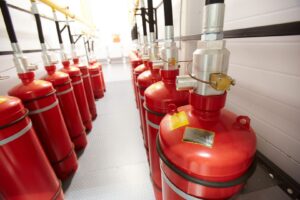
The discontinuation of 3M Novec 1230 as a special hazard fire suppression agent due to PFAS brings more struggles to the special hazard fire suppression industry.
The hot topic in the fire suppression industry, as well as several others, is the shift away from PFAS chemicals. In particular, the use of PFAS chemicals in special hazards fire suppression systems will no longer be an option. 3M, a major multinational chemical manufacturer, announced that it would stop producing Novec 1230 by the end of 2025. Novec 1230 is a popular “clean agent” fire suppression chemical, often used in mission-critical facilities where water damage by water sprinkler systems would create catastrophic problems. With an extreme amount of litigation (3,287 lawsuits between January 2020 and December. 2021, according to Bloomberg Law), 3M announced the discontinuation of all products that include these chemicals. However, this move has the industry wondering – what comes next?
What is PFAS?
PFAS stands for Perfluoroalkyl and Polyfluoroalkyl Substances. As explained by the National Institute of Environmental Health Sciences (NIEHS), PFAS molecules have a chain of linked carbon and fluorine atoms. These create very strong carbon-fluorine bonds that take a long time to degrade. Due to this, they’re commonly referred to as “forever chemicals.” PFAS chemicals have been associated with a wide variety of serious health issues, including cancer.
The fact that these chemicals fail to degrade for an unknown amount of time, agencies such as NIEHS are concerned about the potential for damage to human health due to issues such as bioaccumulation and long-term exposure to PFAS. These concerns have led to widespread restrictions and bans on PFAS chemicals.
How is This Affecting the Fire Suppression Industry?
Special hazard fire suppression systems have been affected by new legislation aimed at restricting and banning the use of PFAS. In fact, many very effective special hazard fire suppression “clean agents” have met their end due to environmental and health concerns. The manufacture of Halon 1301, one of the earliest and most effective clean agents, was banned in 1994 because it was classified as an ozone-depleting chemical. The manufacturing of FM200, the most popular Halon replacement, began a phase-out in 2022 for being identified as a global warming agent. And in 2025 the production of Novec 1230 will be discontinued by 3M. Finally, AFFF firefighting foams have been severely restricted or outright banned in most areas. This has created a challenge to the fire protection industry as they
Ultimately, the special hazard fire suppression industry is facing another major setback as they continue to search for a clean agent that is effective and easy to use. The agent also needs to be safe for use around humans without having a significant negative impact on the environment.
Only time will tell what is next for special hazard suppression agents as the fire suppression industry continues its research and development into appropriate alternatives.
Fire Protection Services from Fireline
Whether you need smoke detectors, fire extinguishers, or an automatic sprinkler system installed at your commercial property, Fireline has you covered. We have been protecting
people and property from fire damage since 1947—and our experience shows in our excellent work! We are known for our superb customer service, our expertise, and our reliability. For more information on how we can help your residential or commercial property, visit us online or give us a call at (800) 553-3405. We are in Baltimore, MD, with a second office in Leesburg, VA. For more fire safety tips, be sure to follow us on Facebook, Twitter, and LinkedIn.
